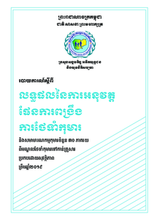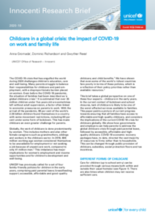Demographic Data
|
Sources: World Bank, UNICEF, UNDP HDR 2015, DHS 2014/2015 |
Displaying 4881 - 4890 of 14348
This booklet is based on a pilot study testing the feasibility of delivering and evaluating a light touch parenting intervention for caregivers in the West Bank.
This report is the culmination of almost four years of research. It gives an overview of the child protection situation in all 195 autonomous countries in the world.
The aim of this deinstitutionalisation (DI) model is to give guidance and a clear, practical approach for deinstitutionalisation for Residential Homes for Children (RHC) in Ghana.
This resource aims to provide evidence-based messages, practical guidance, case studies and resources that can be used to promote parents’ and caregivers’ mental health, with a focus on adolescent caregivers.
This report (in Khmer) presents the outcomes of the implementation of the Action Plan for improving child care with the target of safely returning 30 per cent of children in residential care to their families, including key achievements, lessons learned, and recommendations going forward.
This report presents the outcomes of the implementation of the Cambodian Ministry of Social Affairs, Veterans and Youth Rehabilitation (MoSVY) Action Plan for Improving Child Care and the safe return of 30 per cent of children in residential care to their families, including key achievements, lessons learned, and recommendations going forward.
The Pathways of Care Longitudinal Study (POCLS) is the first large-scale prospective longitudinal study of children and young people in out-of-home care (OOHC) in Australia.
This paper paints a picture of current progress towards ensuring that all families have access to affordable and high-quality childcare, and considers the implications of the current COVID-19 crisis for childcare globally.
This report from the UN Office of the SRSG on Violence against Children explores repatriation, rehabilitation, and reintegration of foreign, Iraqi and Syrian children who are being held in detention on suspected ISIS association or terror-related offenses, or in camps.
This chapter traces and explains responses to deinstitutionalisation reforms in the Russian regions. Three parallel policy shifts are taken into account: deinstitutionalisation (DI), public sector reform, and social provision reform.








